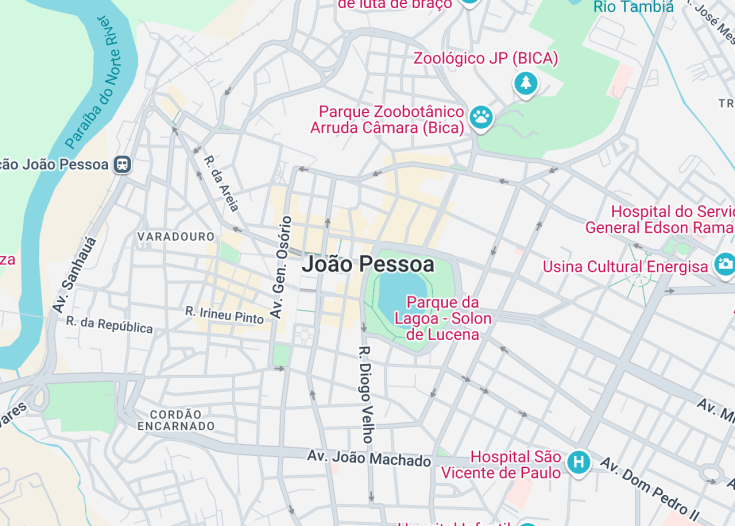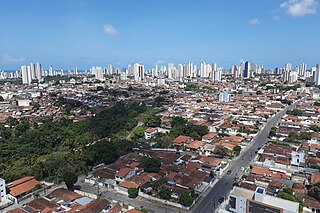João Pessoa, the capital of Paraíba in Brazil, is distinguished for its rich history, vibrant cultural scene, and stunning natural landscapes. Known as one of the oldest cities in Brazil, it offers a tranquil escape with its pristine beaches, lush greenery, and impressive colonial architecture.
The city is particularly celebrated for its sunset at Jacaré Beach, where the sun descends melodiously to the sound of Ravel’s Bolero, highlighting the unique blend of natural beauty and cultural tradition.
Explore the historic Centro neighborhood to appreciate João Pessoa’s colonial past, featuring well-preserved baroque churches and colorful homes.
Don’t miss the opportunity to visit the easternmost point of the Americas, Ponta do Seixas, for a breathtaking view of where the sun rises first in Brazil.
How to best experience ?
Tickets, tours, and activities for are available at these providers:
Click on the logos below to easily compare prices.

Feeling lucky? Try the direct search:
GetYourGuide.com Viator.com Trip.com Expedia.com Tiqets.com Ctrip.com (中文)
João Pessoa: A Vibrant Gateway to the North
| Country | Brazil |
| Time in João Pessoa | GMT-3 |
| Language spoken | Portuguese |
| Population | 817,511 (IBGE 2020) |
| Currency | Brazilian Real (R$ / BRL) |
| Airports |
|
João Pessoa, the capital of Paraíba in Brazil, is steeped in history and rich in Brazilian culture. Founded in 1585, it is one of the oldest cities in the country. Known for its stunning beaches and vibrant green spaces, João Pessoa is a popular destination for those wishing to explore nature and experience the local lifestyle.
It’s also noted for its historic architecture, notably the São Francisco Cultural Center which combines baroque art with colonial history. The city’s strategic position along the Atlantic coast contributes significantly to its economy, primarily through tourism and commerce, reflecting a thriving economic landscape balanced beautifully with its cultural significance.
Where is João Pessoa?
Located in the eastern tip of Brazil, João Pessoa is the easternmost city in the Americas, famously proximate to the beautiful coastlines of the Atlantic Ocean.
Distances:
| Route | Distance by car | Time by car |
|---|---|---|
| João Pessoa to Recife | 75 miles (121 km) | Approx. 1 hour 40 mins |
| João Pessoa to Natal | 114 miles (183 km) | Approx. 3 hours |
| João Pessoa to Fortaleza | 435 miles (700 km) | Approx. 9 hours 25 mins |
What is João Pessoa famous for?
João Pessoa is particularly renowned for its rich cultural heritage, verdant parks, and its position as the first sunrise point in Brazil. Its tropical climate and the historic center’s pastel-colored buildings add unique charm to this Brazilian gem.
History
1500-1585: Before the City’s Founding
João Pessoa, initially inhabited by indigenous tribes such as the Potiguaras, saw its first European contact with the arrival of Portuguese explorer Pedro Álvares Cabral in 1500. Over the ensuing decades, the area became a focal point for French settlers and Portuguese colonists who were drawn by the lucrative pau-brasil (brazilwood). This period was marked by skirmishes and alliances formed with indigenous groups, laying a cultural foundation that predates the official establishment of the city.
1585-1822: Colonial Establishment and Growth
The city of João Pessoa was officially founded on August 5, 1585, as Filipeia de Nossa Senhora das Neves, in honor of King Philip II of Spain and Portugal. Positioned strategically at the mouth of the Sanhauá River, it developed as a significant port for sugarcane production and export. The area witnessed growth in colonial architecture and the establishment of religious missions, which played a pivotal role in community and culture during the Portuguese colonial period.
1822-1889: Brazilian Empire and Development
Following Brazil’s independence in 1822, João Pessoa transitioned from colonial governance to an integral part of the Brazilian Empire. The city saw infrastructural enhancements, including the construction of railways and the development of public institutions, fostering economic and social growth.
1889-1940: Republican Era and Modernization
With the proclamation of the Brazilian Republic in 1889, João Pessoa underwent significant modernization. Previously known as Parahyba, the city was renamed in 1930 in honor of João Pessoa Cavalcânti de Albuquerque, a prominent political figure whose assassination marked a pivotal moment in Brazilian history. This period also saw urban reforms and the growth of commerce and local industries, shaping a modern urban landscape.
1940-Present: Contemporary Developments
In recent decades, João Pessoa has embraced its role as a cultural and economic hub in the Northeast of Brazil. It has developed a robust tourism industry, thanks to its rich history, cultural heritage, and stunning natural landscapes including beaches and tropical forests. Preservation efforts in the historic center juxtaposed with modern developments exemplify the city’s commitment to both heritage and progress.
Visit João Pessoa
What to see and do in João Pessoa
João Pessoa offers a unique blend of historical sites, cultural experiences, and natural beauty. Key attractions include the historic Tambaú and Manaíra beaches, known for their stunning sunsets and vibrant nightlife.
The city’s rich history can be explored through visits to the São Francisco Cultural Center, which houses baroque art and exquisite gold-laden carvings. For nature enthusiasts, the Seixas Natural Pools provide a splendid opportunity for snorkeling amongst vibrant marine life. Additionally, visitors can enjoy:
- The botanical garden, Mata do Buraquinho, showcasing a variety of native species.
- Guided tours of the Cidade Alta, the oldest part of the city, with colonial architecture and the Santa Roza Theater.
Notable Events in João Pessoa
João Pessoa hosts several cultural events that celebrate its rich heritage and vibrant community spirit. Notable among them is the ‘Festa das Neves’, marking the city’s founding day on August 5th with concerts, parades, and fireworks. Another significant event is the ‘São João Festival’ held in June, featuring traditional music, dance, and food, drawing locals and tourists alike.
Best time to visit João Pessoa
The ideal time to visit João Pessoa is between September and February. During these months, the weather is sunny and dry, offering the best beach experience and comfortable conditions for exploring the outdoor attractions and historical sites.
Is João Pessoa worth visiting?
João Pessoa is undoubtedly worth visiting for its captivating blend of culture and natural beauty. As the third oldest city in Brazil, it offers a profound historical experience complemented by its natural sceneries.
Whether you’re looking to unwind on pristine beaches, explore rich cultural sites, or participate in lively local festivals, João Pessoa provides a unique and enriching getaway.

